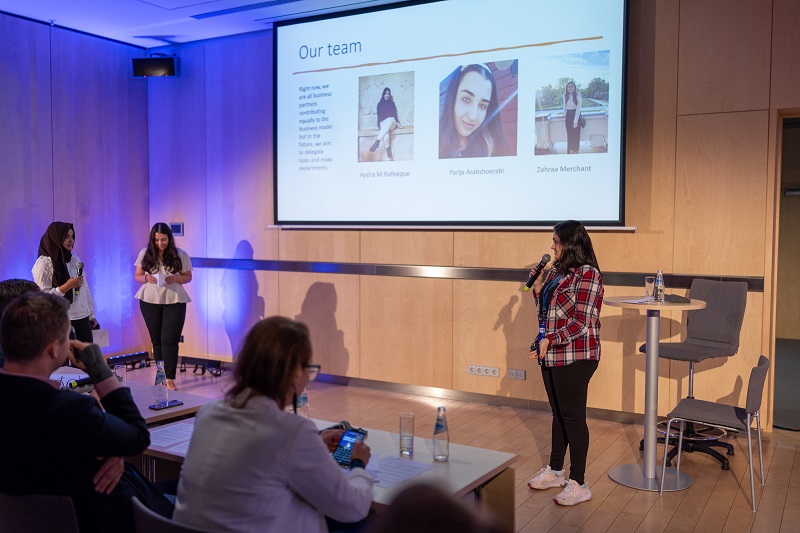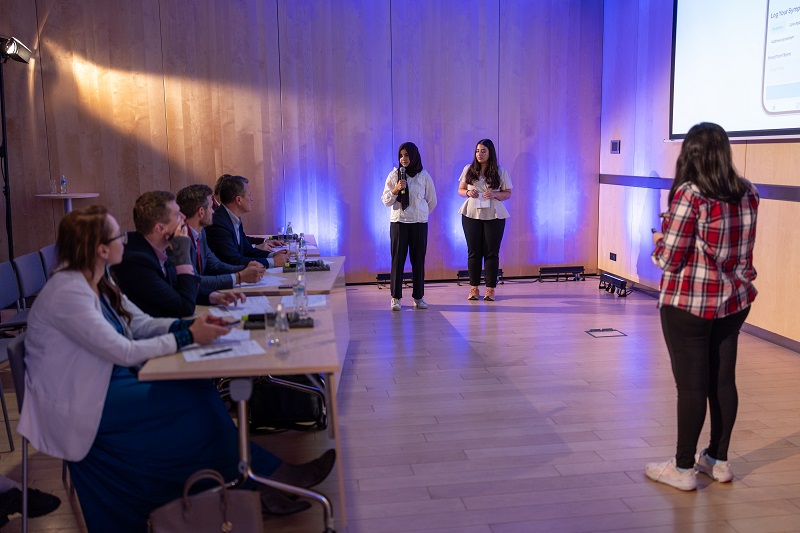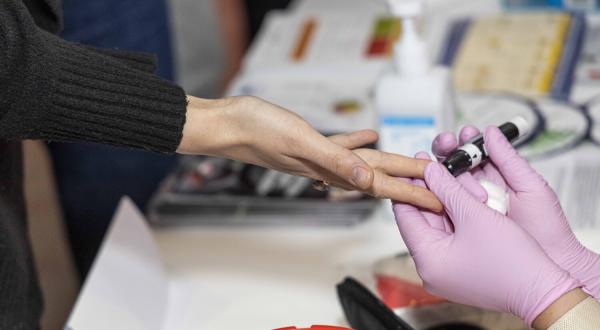RSU students develop app to transform palliative care at i-Days hackathon
Aysha Rafeeque is an eighth-semester medical student at Rīga Stradiņš University (RSU). She is originally from India. Zahraa Merchant is a seventh-semester medical student, also from India. Parija Arabshoorabi is an eighth-semester medical student from Sweden. The three students formed the team Health Connect to participate in the EIT Health i-Days health innovation event for Latvian university students in October this year. The team ended up winning the RSU B-Space Business Incubator special prize of 15 mentoring hours.
Students participating in the hackathon could choose to tackle one of five challenges: improving communication about precision medicine, a tool for personalised care, a solution for effective paediatric palliative care, and digital lab data contribution to better health outcomes. Additionally, the Ministry of Economics presented a challenge of integrating digital health technologies and artificial intelligence into health systems.
Could you share a little more about your specific areas of interest? Was there something about the hackathon that connected to those interests?
Aysha: I’ve been involved with palliative care for a while now, even before I started medical school. In India, palliative care plays a huge role, especially for patients below the poverty line. I volunteered with community organisations that support palliative patients by providing training and resources to non-medical volunteers. It’s a big part of why I chose to study medicine.
When we saw the hackathon’s problem statements, I gravitated towards palliative care. It was something I was passionate about, and fortunately, the team was also on board after some discussion.
Zahraa: Palliative care wasn’t something I had considered before. In fact, I thought it was a rather sad and emotionally difficult area, especially since this particular focus was on paediatric palliative care. But during the hackathon, we spoke with doctors from the field, and their dedication and ability to make a real difference in patients’ lives really inspired me. That’s what convinced me to dive into this topic with the team.
Parija: For me, I didn’t have prior experience with palliative care, but I’ve worked in wards where patients receive palliative treatment towards the end of their care. I’ve always felt it’s an often-overlooked area of medicine. The paediatric focus made it even more meaningful to me.
It’s an area that deserves more attention and resources, which is why I found the hackathon so interesting.
Aysha, you mentioned volunteering in India. Could you explain how palliative care is structured there and how that influenced your idea?
Aysha: In India, with such a massive population, the need for palliative care is much higher. We have community-based systems where non-medical volunteers receive training to support patients. There are dedicated palliative care centres located strategically for easy access. Patients are prioritised based on their needs, and data is regularly updated to ensure timely care.
When we heard how palliative care is managed in Latvia, we learned it was much less organised—relying on outdated methods like Excel sheets. That’s where our idea came in. We wanted to create a scoring system in the form of an app that could streamline the process, similar to what I’ve seen work in India, but adapted to Latvia’s specific needs.
Could you describe how the hackathon process worked? Did you arrive with a fully formed idea, or did it develop on the day?
Zahraa: We didn’t come in with a concrete idea. In fact, we signed up quite late and arrived feeling a bit lost. But as we started talking to mentors, including doctors, business experts, and marketing professionals, we realised the core issue in the field was the lack of organisation.
The doctors emphasised how much time was wasted on administrative work, so we focused on solving that. Over the day, the mentors challenged us with questions about implementation, marketing, and financial viability. Their guidance helped us shape the project step by step.

The team Health Connect present themselves at the hackathon. Photo: PMNET Forum

Health Connect present their idea. Photo: PMNET Forum
Could you give a brief overview of your project?
Aysha: Our project is essentially an app-based system for palliative care that prioritises patients based on their needs. It’s a two-way platform where both patients and healthcare providers can log in.
Zahraa: For doctors, it includes a patient priority list that updates automatically based on symptom severity, caregiver burden, and other factors. For patients, it offers features like emergency contacts, access to medical equipment, booking social and psychological support, and even instructional videos for tasks like changing a urinary catheter.
Aysha: We also integrated a "code blue" button for emergencies, which redirects patients to the nearest hospital. The app is based on Latvia’s specific needs but draws from European palliative care guidelines and my experiences in India.
What was the prize you received, and what does it mean for the future of your project?
Aysha: We received 15 hours of mentoring to help develop our idea further. For now, we’ve had to put it on hold due to exams, but we plan to pick it up again in a few weeks.
We were awarded the special mention because the mentors saw significant improvement in our idea from start to finish during the hackathon.
Has this experience changed how you approach your studies or your future career plans?
Zahraa: Definitely. It gave me insight into how much administrative work is involved in healthcare. Before this, I only saw the patient-facing side during my hospital rotations. Now, I understand the importance of systems that support doctors behind the scenes. This will influence how I choose my specialty in the future.
What would you say to your classmates or others who haven’t participated in something like this before?
Aysha: I’d strongly recommend it. It’s a unique opportunity to work on real-world problems and learn skills that go beyond the classroom.
Parija: it’s also a great way to meet people from different fields and gain a new perspective on healthcare challenges. It has influenced how I will think about my specialty in the future.
Zahraa: It’s a chance to step out of your comfort zone and make a real difference. I’d say go for it—you won’t regret it.
Related news
 RSU Health Day attracts many first-time donors and large number of student research groupsFor RSU Employees, For Students
RSU Health Day attracts many first-time donors and large number of student research groupsFor RSU Employees, For Students


